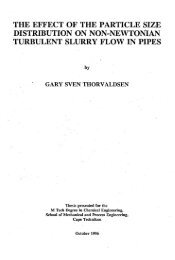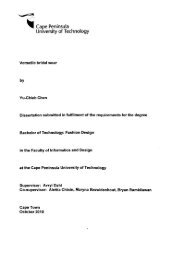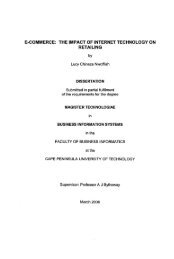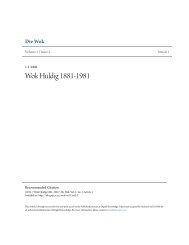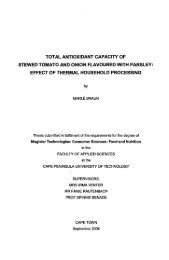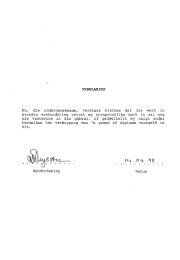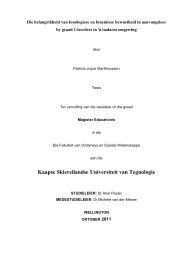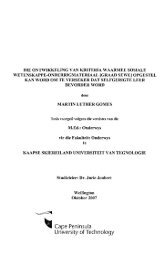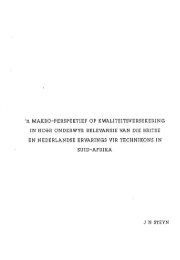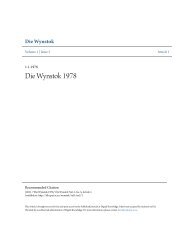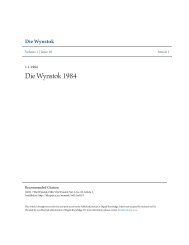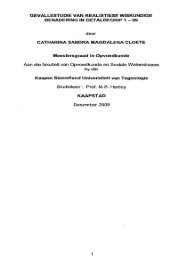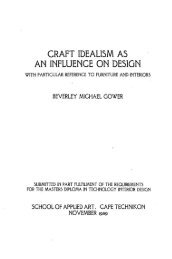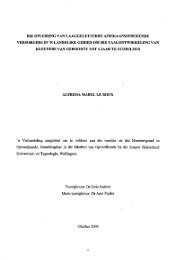an investigative analysis of the psychological characteristics and job ...
an investigative analysis of the psychological characteristics and job ...
an investigative analysis of the psychological characteristics and job ...
You also want an ePaper? Increase the reach of your titles
YUMPU automatically turns print PDFs into web optimized ePapers that Google loves.
2.3.16 Fair<br />
Simoncelli (2003:46) agrees with <strong>the</strong> above when he states that ethics stem from values. Avalue in<br />
itself is a belief <strong>an</strong>d a feeling <strong>of</strong> goodwill. He fur<strong>the</strong>r explains that values become principles that<br />
guide us along in <strong>an</strong> acceptable normative system.<br />
Macleod (2001:9) is <strong>of</strong> <strong>the</strong> opinion that most people aspire to conduct <strong>the</strong>ir personal <strong>an</strong>d<br />
pr<strong>of</strong>essional affairs with ethical integrity. The CEl must conduct himself in <strong>an</strong> ethical way at all<br />
times. He has a responsibility towards <strong>the</strong> students, <strong>the</strong> employers <strong>an</strong>d <strong>the</strong> academic institution to<br />
act in amoral way.<br />
Carrel, et al. (1997:100) state that faimess is doing what is fair <strong>an</strong>d being impartial in all activities.<br />
The eEL should treat all role players in <strong>the</strong> co-operative education process fairly <strong>an</strong>d without<br />
prejudice. All students should be treated in <strong>the</strong> same m<strong>an</strong>ner <strong>an</strong>d <strong>the</strong> rules <strong>an</strong>d processes set out<br />
by <strong>the</strong> CEl <strong>an</strong>d <strong>the</strong> academic institution should be applicable to everyone. The CEl must be<br />
impartial in all problem <strong>an</strong>d conflict situations.<br />
2.3.17 Flexible<br />
Rncham <strong>an</strong>d Rhodes (1999:110) define flexibility as acting to adapt to <strong>an</strong>d work effectively with a<br />
variety <strong>of</strong> situations, individuals or groups. This pertains to <strong>the</strong> ability to underst<strong>an</strong>d <strong>an</strong>d appreciate<br />
different <strong>an</strong>d opposing perspectives on <strong>an</strong> issue, to adapt one's approach as <strong>the</strong> requirements <strong>of</strong> a<br />
situation ch<strong>an</strong>ge, <strong>an</strong>d to ch<strong>an</strong>ge or easily accept ch<strong>an</strong>ges in one's own org<strong>an</strong>isation or <strong>job</strong><br />
requirements.<br />
CELs should be flexible in <strong>the</strong> m<strong>an</strong>agement <strong>of</strong> <strong>the</strong>ir tasks. Nadler, et al. (1999: 262) conclude that<br />
CEls who practise flexible m<strong>an</strong>agement are not constrained by arigid set <strong>of</strong> previous experiences.<br />
They are able to adapt <strong>the</strong>ir m<strong>an</strong>agement style to <strong>the</strong> situation or problem at h<strong>an</strong>d <strong>an</strong>d approach it<br />
with <strong>an</strong> open mind. Chapm<strong>an</strong>, et al. (1999:27) mention that it is possible that employers needs may<br />
38



